People sometimes refer to biltong and beef jerky interchangeably, and admittedly, they have some similarities. Usually, biltong is cured in larger slabs of meat, whereas jerky is cured in strips. Biltong retains a little moisture, which some people think may shorten its shelf life, but we’ll return to that point at the end of the recipe.
The other difference between jerky and biltong is that traditional biltong is sometimes made with the fat of the meat intact, whereas jerky or biltong that you intend to store for a decent length of time, without refrigerating, needs to be made with lean meat.
Ultimately, making biltong means that you can safely store meat in a really delicious, spicy way.
Ingredients:
- 4.4 lbs (2kg) lean beef or other red meat or game. Bear in mind that lamb doesn’t work well as biltong.
- 3 cups very coarse sea salt
- 2 cups soft brown sugar
- 1 scant teaspoon bicarbonate of soda (optional)
- 2 tablespoons coarsely ground or crushed black peppercorns
- 4 tablespoons of coarsely crushed or ground coriander seeds
- 5 cups brown/balsamic vinegar combined with 100 ml Worcestershire sauce, or all vinegar
Method:
- Cutting along the grain – not against it – slice the meat into slabs around 1 cm thick,then lay in the vinegar mix for 30 minutes. Keep the vinegar in the refrigerator, as you’ll need it later.

- Meanwhile, crush the spices and mix with the salt, sugar and bicarbonate of soda (if using) before sprinkling evenly onto a plate.

- Press the slices of meat into the spice and salt mixture to coat thoroughly.

- Placing the thicker slices in the base, layer the meat in a clean dish, pressing any remaining spice mixture on top of the final layer. Refrigerate for 8 – 12 hours, turning the slices at the halfway point.

- Remove and place in the vinegar bath again, this time for 15 minutes. Take the meat out of the vinegar, trying to rinse each piece in the vinegar solution as you do so, and leave as much of the salt behind as possible.

- Squeeze each piece of meat to extract as much moisture as possible.

Now when it comes to drying biltong, you have a few options.
Oven Drying
If you own a dehydrator, then check the manufacturer’s instructions on drying meat, as models do vary. You can also try drying in a very low fan oven, opening the door regularly to allow moisture to escape, for around 6 – 8 hours. Suspending the pieces of biltong from the highest oven shelf, using skewers threaded through each piece of meat, works well.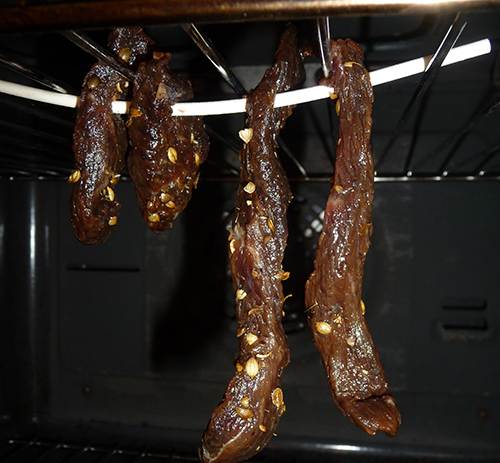
Traditional Drying
If you don’t live in a humid area, and you have somewhere that is free of flies, isn’t open to passing birds and has good air circulation, then dry the biltong in the traditional way, hanging it on meat hooks (strong, covered large paperclips work too) for between 5 – 15 days. You’ll have to keep checking the moisture content, and the drying times will vary greatly.
If you do get a spoiled piece of meat, then the chances are that the others will be fine, so don’t lose heart.
Shelf Life
A good rule of thumb is the drier the meat, the longer it will last as the lack of moisture will inhibit microbial action. Fat can cause it to go rancid, which is why lean meat works better for prepping purposes.
You can of course keep your biltong in the fridge; but at a cool room temperature, properly dried and stored biltong should be good to eat for anything from two months to a year. Moisture is the enemy, so make sure the meat is dry, wrapped in clean, breathable paper and kept in a well-ventilated place.
Once you have the basic technique down then experiment with other flavors and spices that you like. Dried chilies, teriyaki seasoning and garlic powder are popular.
The Truth About Biltong
As with so many well-traveled and traditional recipes, there’ll always be firmly held opinions on what’s right and wrong, but the one thing that seems to be true of all biltong recipes is that the delicious results never seem to hang around for as long as planned!
You may also like:
 50 Days of ‘Survival’ Calories with Rice and Beans
50 Days of ‘Survival’ Calories with Rice and Beans
H2O Dynamo – The Awesome Device That Turns Air Into Water (Video)
Homemade 72 Hour Emergency Food Supply Kits

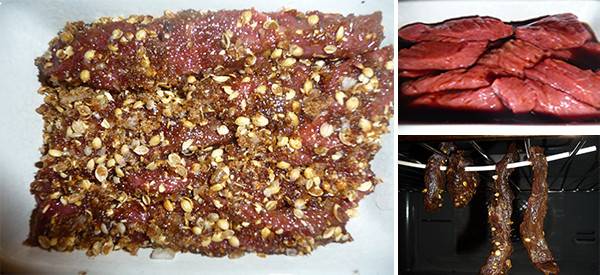
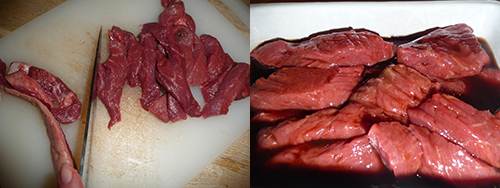



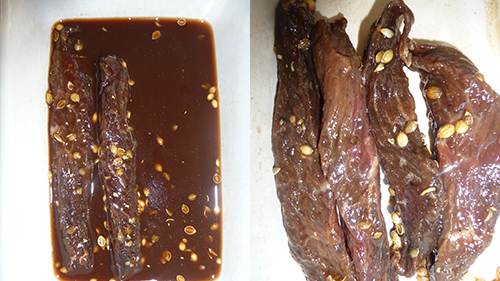
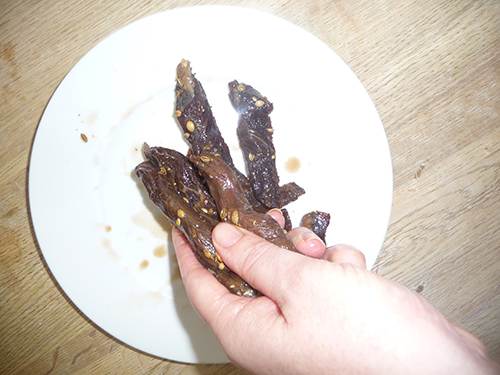










Can a dehydrater work for this recipe?
yes
Make Biltong with the dehydrater since I came to the uk from South Africa and works well.
dont put biltong in the fridge it makes it damp and can smell
The difference between biltong and jerky is that jerky dries in an oven snd biltong in open air or with a fan, but not with heat.
Oh yes go onto ebay and get the South African spice mix
Thanks for the article. I’m always on the lookout for articles that have long shelf life food.
Would smoking like a cold smoke . To help dry and keep flies and other pest from invading the drying meat ?
I’m not much of a commentor, but I am learning a lot and ppreciate it it.
Thank you.
That looks delicious! Is the black pepper for flavor, or also a preservative?
What is your estimate of the shelf life of biltong vacuum packed and frozen in a freezer? I have rice thus stored and I plan on leaving it frozen until I drop dead or the end of the world happens. I don’t imagine it going “bad”. It may lose some nutritional value, but I wonder how much that would be. There doesn’t seem to be any fact-based answer to that question that I have found.
By the way, once again, a useful, informative post. Thanks.
i would think vac packing would help like with most things , but i would like to know on this point also ,
@Left … I too have searched for legitimate studies on the “loss” of nutritional value for stored foods …. so far, all I’ve found are wive’s tales and scuttlebutt …. would sure like to see some facts.
Any opinions on cold smoking as the final step??
This is a good recipe, but I use cayenne pepper, and soy sauce. Then, slow smoke over night…
Anyone? The recipe calls for coarse sea salt and brown? /balsamic vinegar. alternatives? Hard to believe these were commonly available 200 or more years ago.
Dont put all that rubbish in you meat, just go to ebay and get the South African spice mix, put the mix on a large tray and then roll your cut meat into the thing layer of spice you will get the hand of it
This is a good recipe, but I use cayenne pepper, and soy sauce. Then, slow smoke over night…
I’ve been making biltong for about five years. I use oyster sauce, soy sauce, Worcestershire sauce in equal portion, curing salt and baking soda. Marinate over night then dehydrate for ten hours at 145*, cool then vacuum bag for ‘ever’. Still eating on some from first year. I was originally told that that process would last ten years. They haven’t died yet nor I so I’ll take is truth!
Bob, dont waste your time with all that junk, go to the ebay and get the South African biltong spice mix and you will find it great, and dont put much spice mix on, I get a 200g bag and lasts a long time
Hey Bob da dee bob! Not sure if you will get this message as its many years later but I have an industrial dryer which doesnt have any temperature so was wondering how I could still use your procedure without heating the meat to dry it out for 10 hours? Could I just dry it out as normal without any heat? Thanks so much
Any suggestions for rehydrating the biltong and/or recipes?
Can you use chicken in this recipe because I do not eat red meat of any kind only poultry and seafood. So, that is why I am asking if can use chicken or turkey
Zee,
get your spice from ebay its the south african biltong spice mix, cut your chicken up thing slisers place the spice mix thing on a tray and roll the chicken and into your dryer
after a day try and love the chip taste, you will finish a chicken chips in a day or two..
have fun